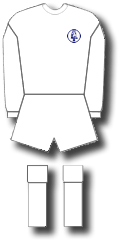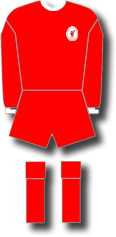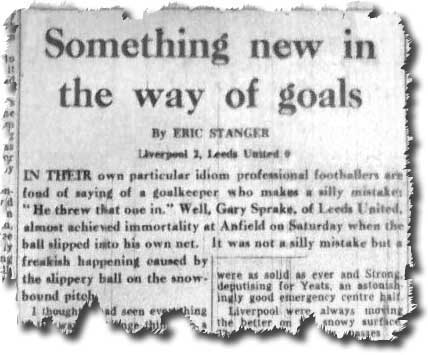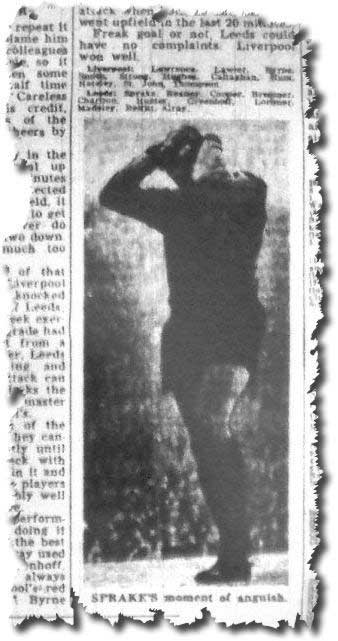 |
 |
 |
 |
 |
 |
 |
 |
 |
First Division - Anfield - 39,675
Scorers: None
Liverpool: Lawrence, Lawler, Byrne, Smith, Strong, Hughes, Callaghan, Hunt, Hateley, St John, Thompson
Leeds United: Sprake, Reaney, Cooper, Bremner, Charlton, Hunter, Greenhoff, Lorimer, Madeley, Belfitt, Gray
At the time, the two teams were in hot pursuit of the league championship
in a four-way battle with the two Manchester clubs, United and City. Three
points separated the teams but it was Liverpool (1 defeat in 8) and Leeds
(9 points from the last 12) that were the sides in form. With such a close
race, the points at stake were vital for both clubs. Phil Brown in the Evening Post: 'November turned up trumps for
Leeds United after all. In its 30 days they jacked themselves up to fourth
in the First Division, made themselves a place in the quarter finals of
the League Cup, and came back from Belgrade leading 2-1 in the Fairs Cup
after a performance just as sterling as that they put up at Nottingham
last week. 'They could really be in the groove again. Time will tell, but personally
and possibly cautiously I want to get the memory of their injuries and
their falterings against Coventry City and Sheffield United just a little
further away. 'Today's game against Stoke at Elland Road - I write before it - next
Wednesday's return Fairs Cup game with Partizan (a fine hard side if their
hearts were not broken on Wednesday, and it didn't look like it), and
the visit to Anfield (I almost wrote the visit to the Kop) next Saturday
should tell plenty. 'In the meantime, there was no mistaking the tremendous and sustained
upsurge of their form as a team against the Forest and against Partizan.
Those two wins were 90 minute wins with United looking the winners before
half time.' Leeds had Paul Madeley and Rod
Belfitt replacing the injured Johnny Giles and £100,000 centre-forward
Mick Jones, but were otherwise at full strength, while Liverpool
were forced into only their third change of the season, with Geoff
Strong deputising for the injured Ron Yeats and World Cup winner
Roger As the game kicked off, there was an inch of snow on the pitch, but it
was soft underneath and World Cup referee Jim Finney had no hesitation
in declaring the match on. Stuart Sprake and Tim Johnson in Careless
Hands: The Forgotten Truth Of Gary Sprake: 'What most people don't
know or have simply chosen to forget is just how atrocious conditions were at Anfield.
In the UK that weekend forty-seven counties were in the grip of snow and
ice and twenty-one other matches in the League programme had already been
postponed, falling victim to the terrible conditions.' The United defence found it difficult early on to get to grips
with the slippery surface and struggled to keep their feet as
the Liverpool wingers, Ian Callaghan and Peter Thompson, penned
them back. Liverpool adapted the better to the conditions and
hit the ball forward quickly and directly whenever they had the
opportunity. United played a more cautious, circumspect game,
often making more passes than was advisable and seeing the ball
sticking on the pitch or skidding on past its intended target. In the very first minute, Thompson rounded Paul Reaney and fired
in a decent cross, which Norman Hunter headed clear from Tony
Hateley. Thompson was straight back in the action, firing in a
shot that went so narrowly wide that Sprake was forced into a
covering dive. The keeper had to touch the ball over the bar when
Chris Lawler put in a header from a Callaghan corner. United were just starting to make their mark on the game with
some smart breaks, when Liverpool took an 18th minute lead. Hateley
beat Jack Charlton to feed
Roger Hunt down the middle. Reaney and Hunter converged on the
England man, but both misjudged things, giving Hunt a second chance.
He made no mistake, swerving round them to slide the ball into
the net to Sprake's left. Liverpool continued to have the better of the play with Callaghan and
Thompson giving Cooper and Reaney endless trouble with their tricky wing
play. Eric Stanger in the Yorkshire Post: 'With Madeley at No 9,
performing a midfield role and doing it well enough to be one of the best
players on the field and Gray used as a link forward, Greenhoff,
Lorimer and Belfitt were always struggling against Liverpool's red wall
in which Smith and Byrne were as solid as ever and Strong, deputising
for Yeats, an astonishingly good Leeds were struggling manfully to stay in the contest as half
time approached, but Fate took a hand with two minutes to go. A Liverpool attack was thwarted and Jack Charlton passed the
ball back to Sprake, on the edge of his goal area. The Reds forwards
trotted back to their marks as Sprake readied himself to throw
the ball out to left-back Terry Cooper, standing mid way between
penalty box and touchline. It was a move Sprake had instinctively
performed hundreds of times before in getting his side back onto
the attack. Out of the corner of his eye the Welshman caught sight of Ian Callaghan
edging
out towards Cooper and he thought better of the quick throw. Roger Hunt
was still close by, but represented little danger. Sprake intended to
clutch the ball to his chest and readjust his position before clearing
more safely. Stanger: 'When he carried on with his throw the ball, instead
of leaving his gloved palm near the top of the arc, stayed there for one
split second and, on being released, it sailed over his left shoulder
into the net.' It is said, apocryphally, that referee Jim Finney, who had missed the
incident, asked Jack Charlton what had happened and what he should do.
According to Sprake and Johnson, 'With typical dry humour Jack replied,
"I think the silly so and so has thrown it in his own net; you'll
have to give a goal."' Sprake stood transfixed with despair for seemingly an eternity
as the enormity of what he had done settled upon him. It was a
spectacular own goal, one of the most memorable of all time, and
Sprake clearly wished that the Anfield turf would open up and
swallow him whole in his moment of misery. Billy Bremner consoled his distraught keeper as the teams went off at
the interval, but Anfield was ready to turn the screw. During the break,
the home club's disc jockey waggishly featured Des O'Connor's No 1 hit
of the time, Careless Hands, and The Scaffold's Thank U Very
Much in sarcastic tribute to the Welshman. Few teams fight back from a goal down at Anfield, let alone two, and
United simply did not have the firepower or momentum to get back into
the game after half time. Billy Bremner ('moving like a ballet dancer
on the difficult surface' - Stanger) did his best to inspire his troops,
covering every blade of grass on the pitch. He operated exclusively as
an auxiliary striker over the final 20 minutes ('where he usually kept
three men occupied' according to Brian Crowther in The Guardian),
but he could not turn the game single-handed. All United's attempts to
get on the scoresheet came to naught, as Crowther reported: 'The more
men Leeds brought into attack the more disorderly they became.' Stanger was similarly unimpressed: 'Apart from a couple of shots by Lorimer,
Leeds never looked like scoring and, though the patched up attack can
do well on occasion, it lacks the drive and experience to master such
defences as Liverpool's. Freak goal or not, Leeds could have no complaints.
Liverpool won well.' It was a grim day for Don Revie's men and the result brought an unceremonious
end to their good run, but the lasting memory was the forlorn figure of
Sprake, soundlessly asking himself 'Why me?' History seldom deals in shades of grey and Sprake has been pilloried
for his habitual mistakes, but at the time he was accorded more generous
consideration. Stanger: 'It was not a silly mistake but a freakish happening
caused by the slippery ball on the snowbound pitch … I doubt if Sprake
could repeat it if he tried. I did not blame him for a moment, nor did
his colleagues or manager, Mr Don Revie
… Sprake, to his credit, turned the ribald jeers of the notorious Spion
Kop to cheers by his second half display.' Terry Lofthouse in the Evening Post: 'Although Gary Sprake gave
away perhaps the most amazing goal seen on a soccer pitch in the defeat
at Anfield, nobody on United's staff could blame him or did. Up to that
point Sprake had made several good saves and in the second half, to his
great credit, he never allowed the incident to upset him and his excellent
effort brought admiration.' Tom German in The Times: 'Carelessness or sheer misfortune, one
could only sympathise with Sprake, who later regained his undoubted stature
with some characteristic saves.' Sprake himself was remarkably philosophical about the incident, saying
later: 'Obviously I wish I hadn't made any mistakes but it is an inevitable
part of being a goalkeeper. I have read lots of comments that I was nervous
and that I somehow lost my confidence due to the mistakes but this was
never the case. I openly admit that before a game I would be terribly
nervous and sometimes be physically sick but I had been like that since
the start of my career. Once I started the game I would be fine and, although
I would be angry at myself and disappointed if I made an error, I can
honestly say it never affected my confidence. If I made a mistake, I would
put it behind me and get on with the game. I think the games where I made
mistakes prove that, such as at Anfield. Even though I scored the own
goal, during the second half I played really well. 'That day at Liverpool I actually had a good game. At half-time the lads
told me, 'Come on, get yourself together. We can do better'. We never
criticised each other apart from me and Big Jack [Charlton], and that
was all forgotten afterwards. I never got much stick off the supporters,
then or now. It has mainly been the ex-players' books.' Down the years the criticism of Gary Sprake has probably been
overplayed, but that day at Anfield wouldn't be the last time
that the keeper made a high profile error on the big stage. It
is doubtful, though, that there was ever a more famous gaffe.

 On occasion a player's entire career is defined by a single incident
in a single match - in December 1967, that was certainly the case for
Leeds United keeper Gary Sprake when he paid a visit to Anfield, home
of mighty Liverpool.
On occasion a player's entire career is defined by a single incident
in a single match - in December 1967, that was certainly the case for
Leeds United keeper Gary Sprake when he paid a visit to Anfield, home
of mighty Liverpool. Hunt standing in as skipper.
Hunt standing in as skipper. emergency centre-half.'
emergency centre-half.'